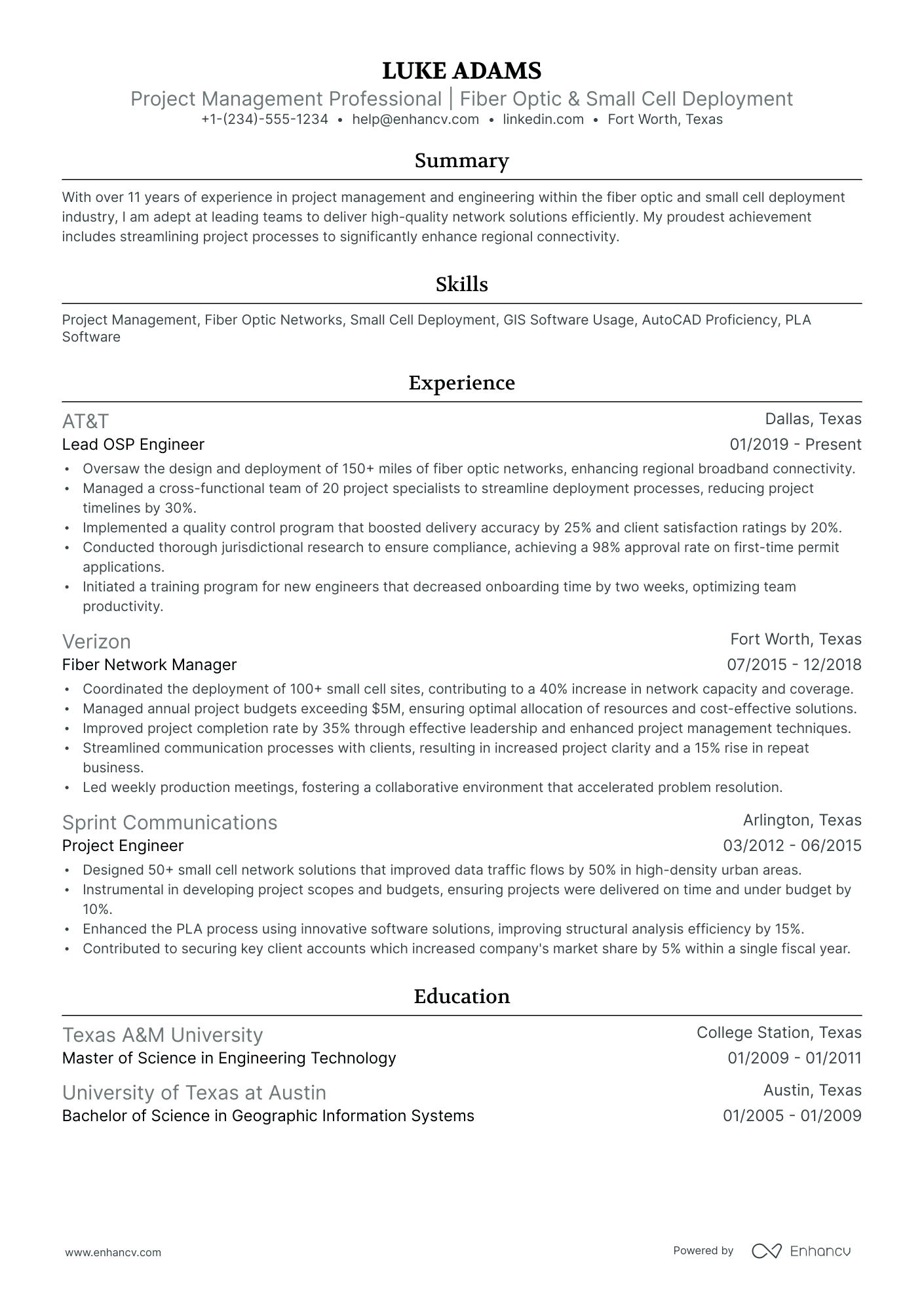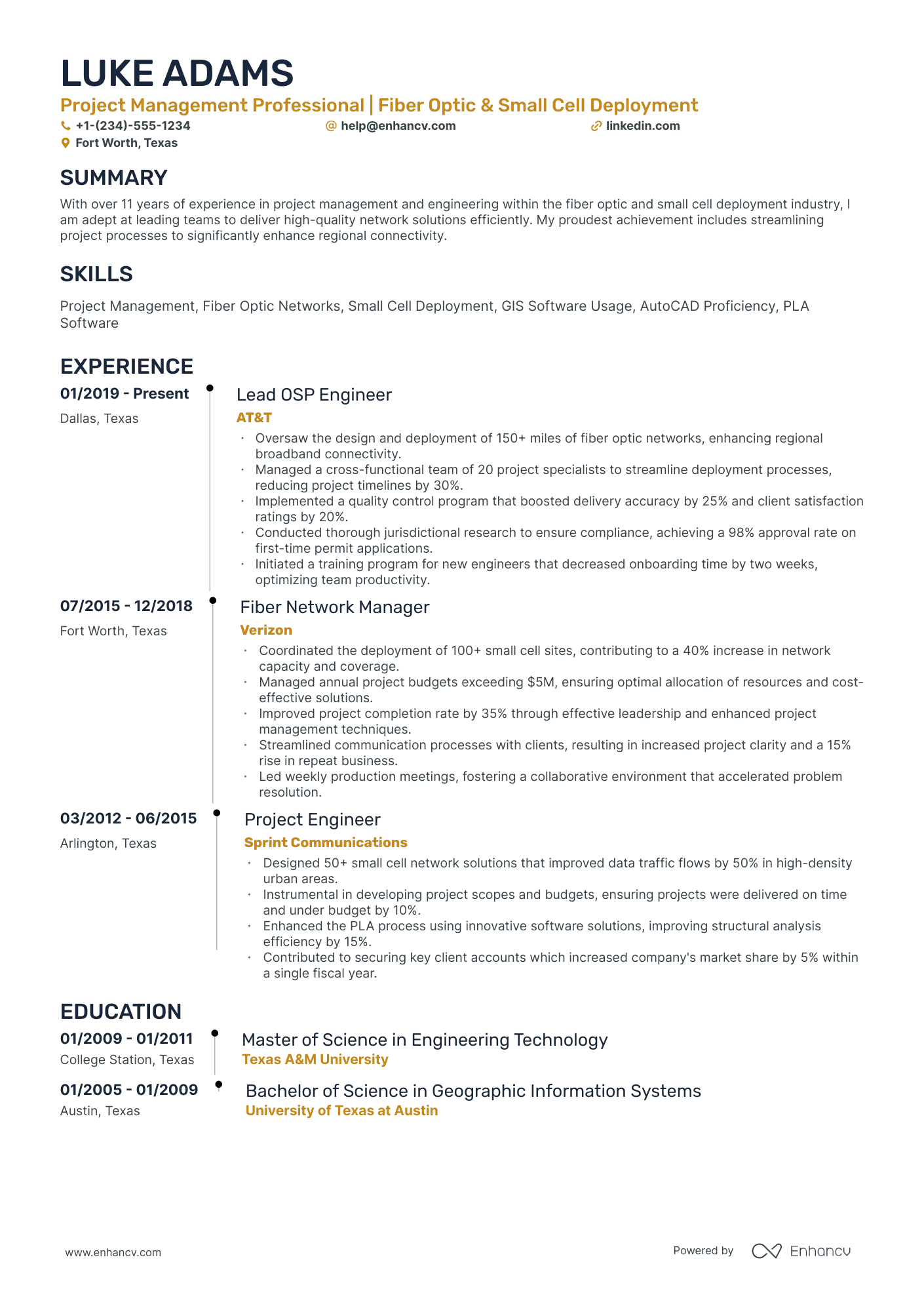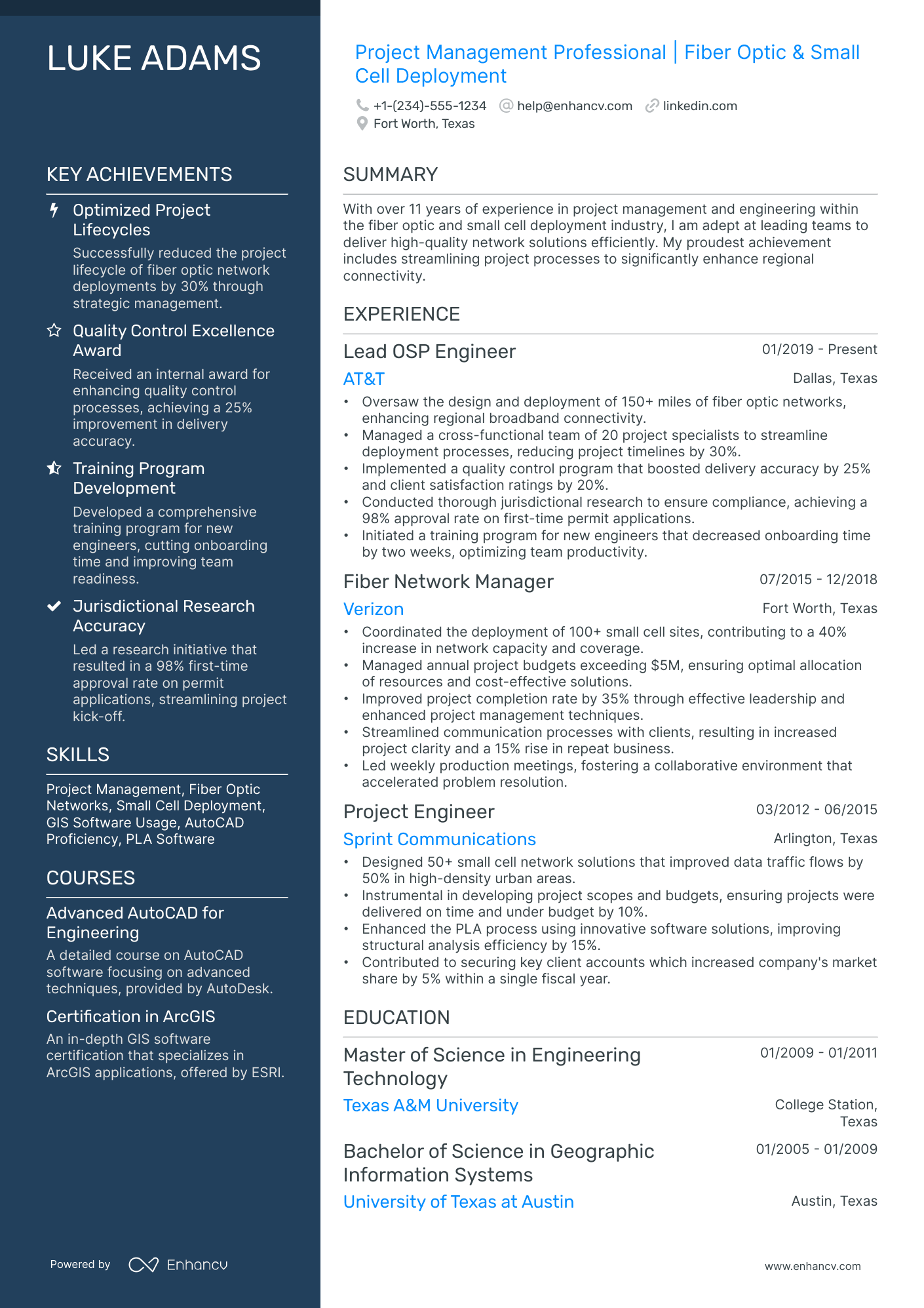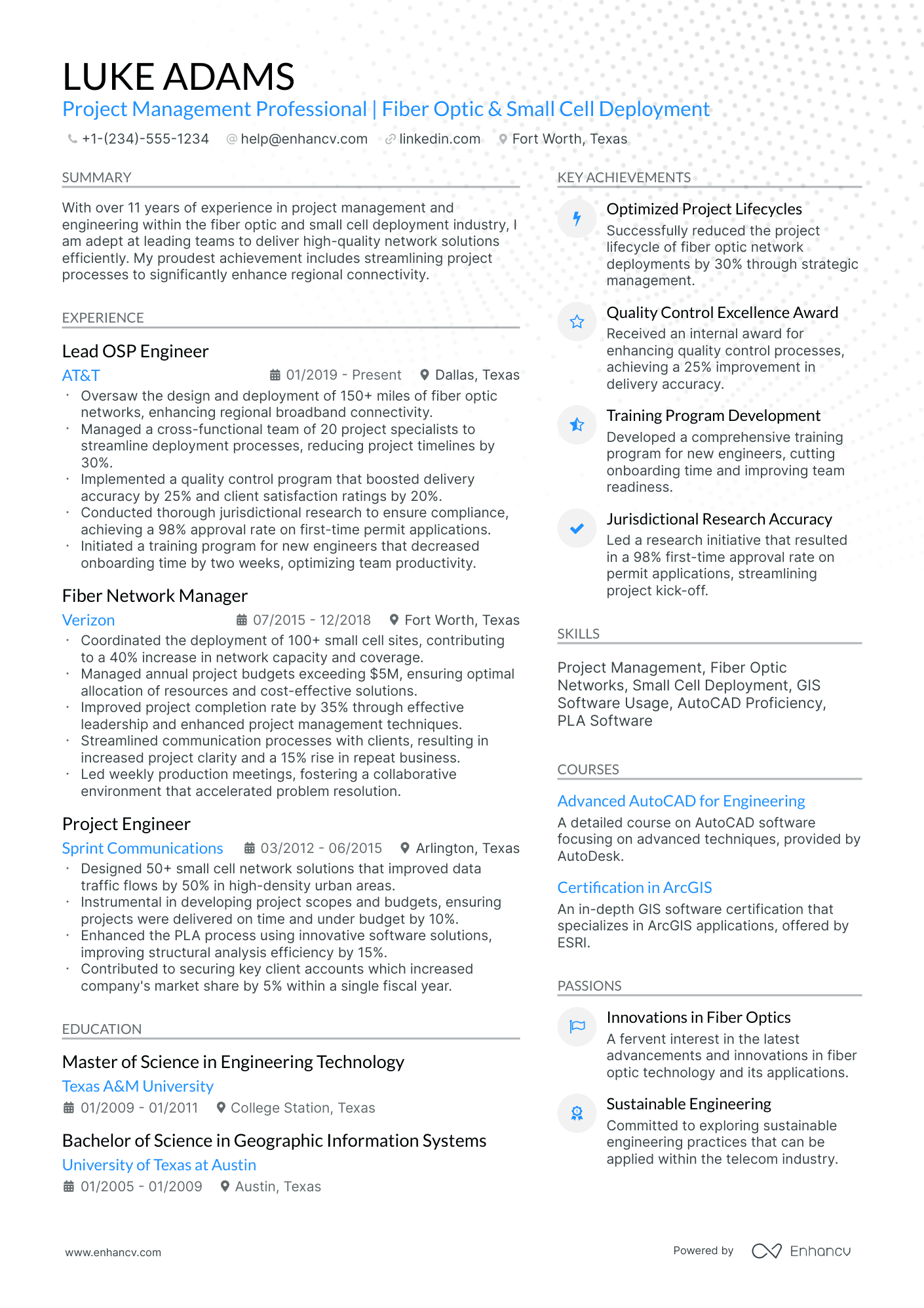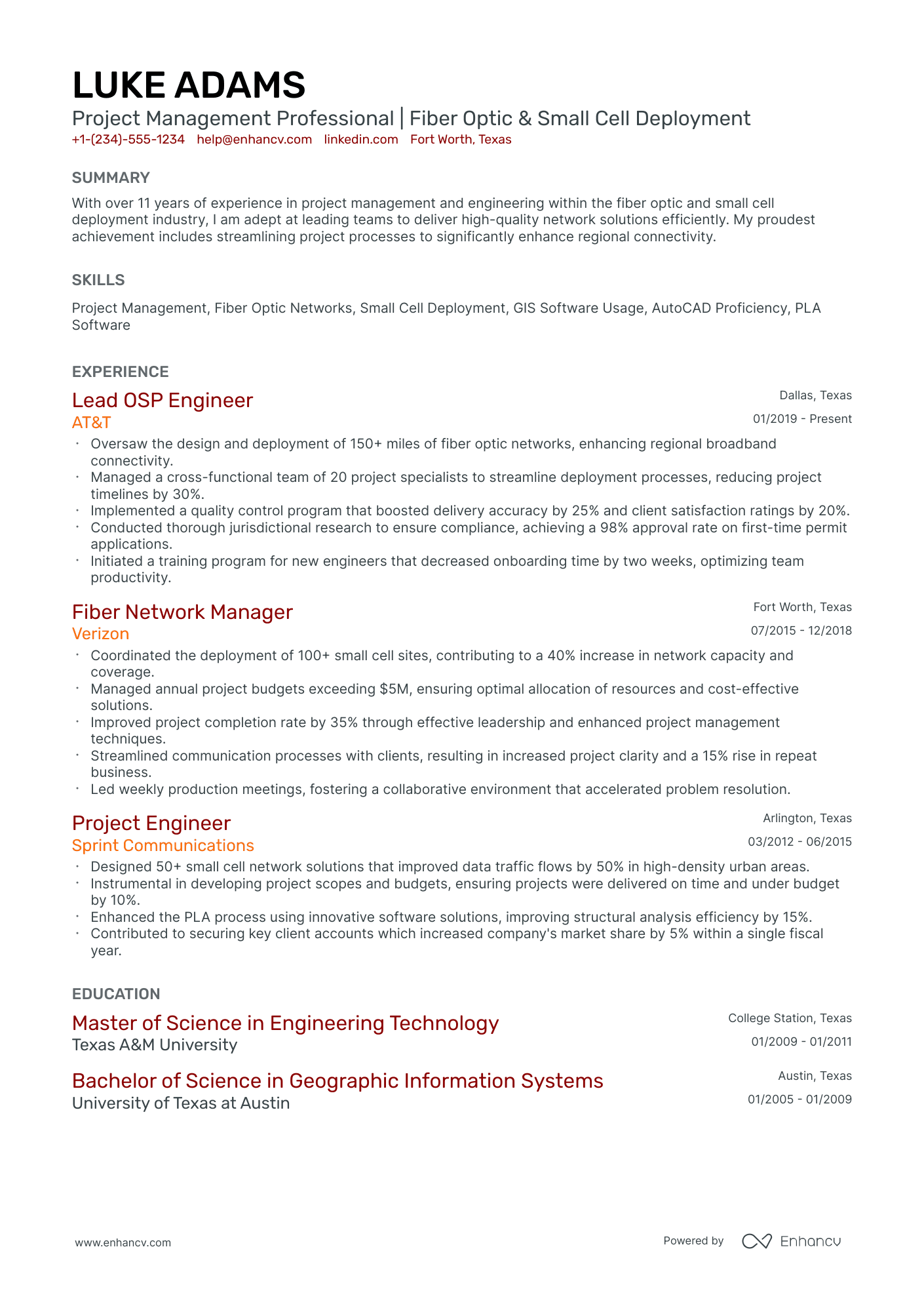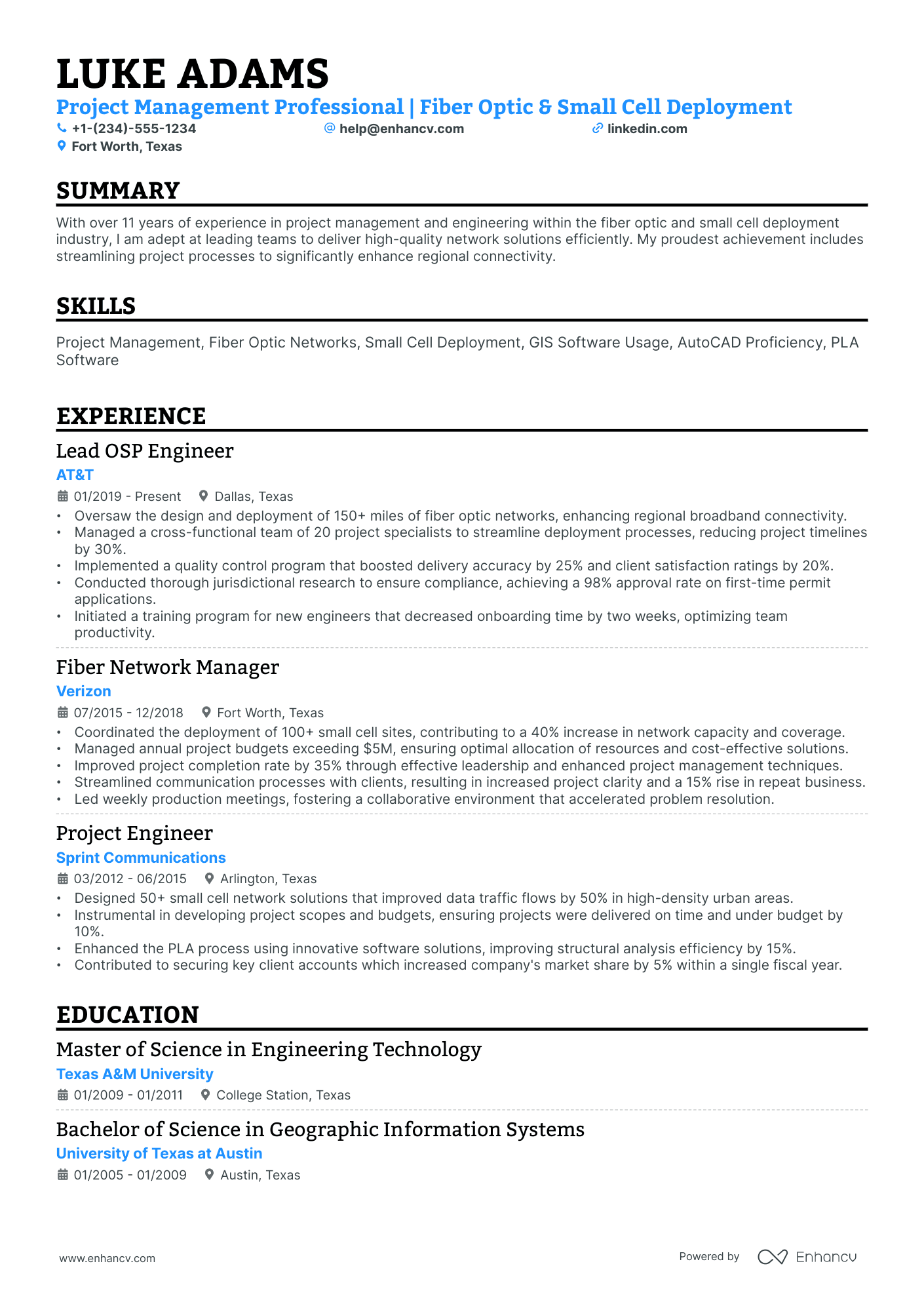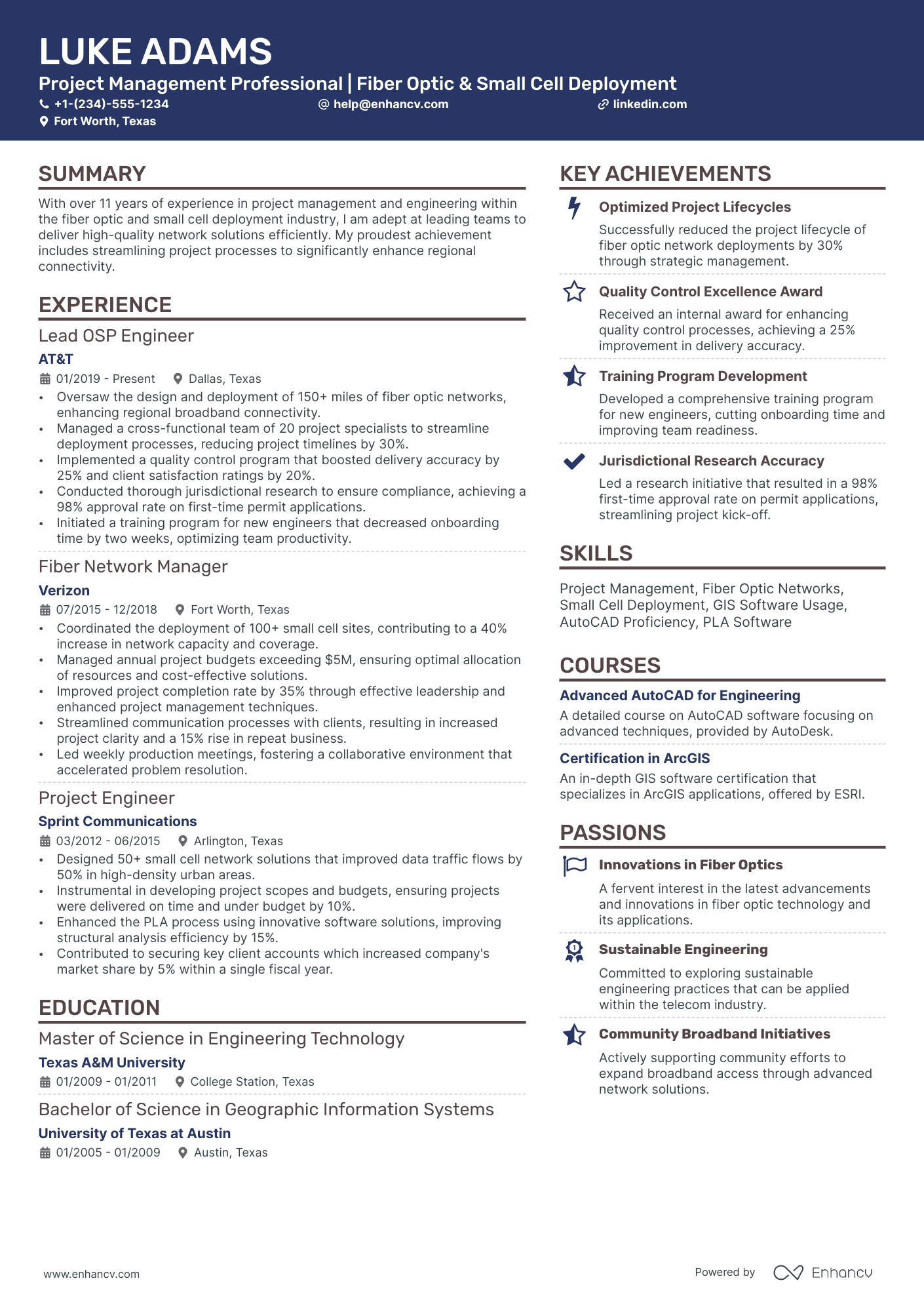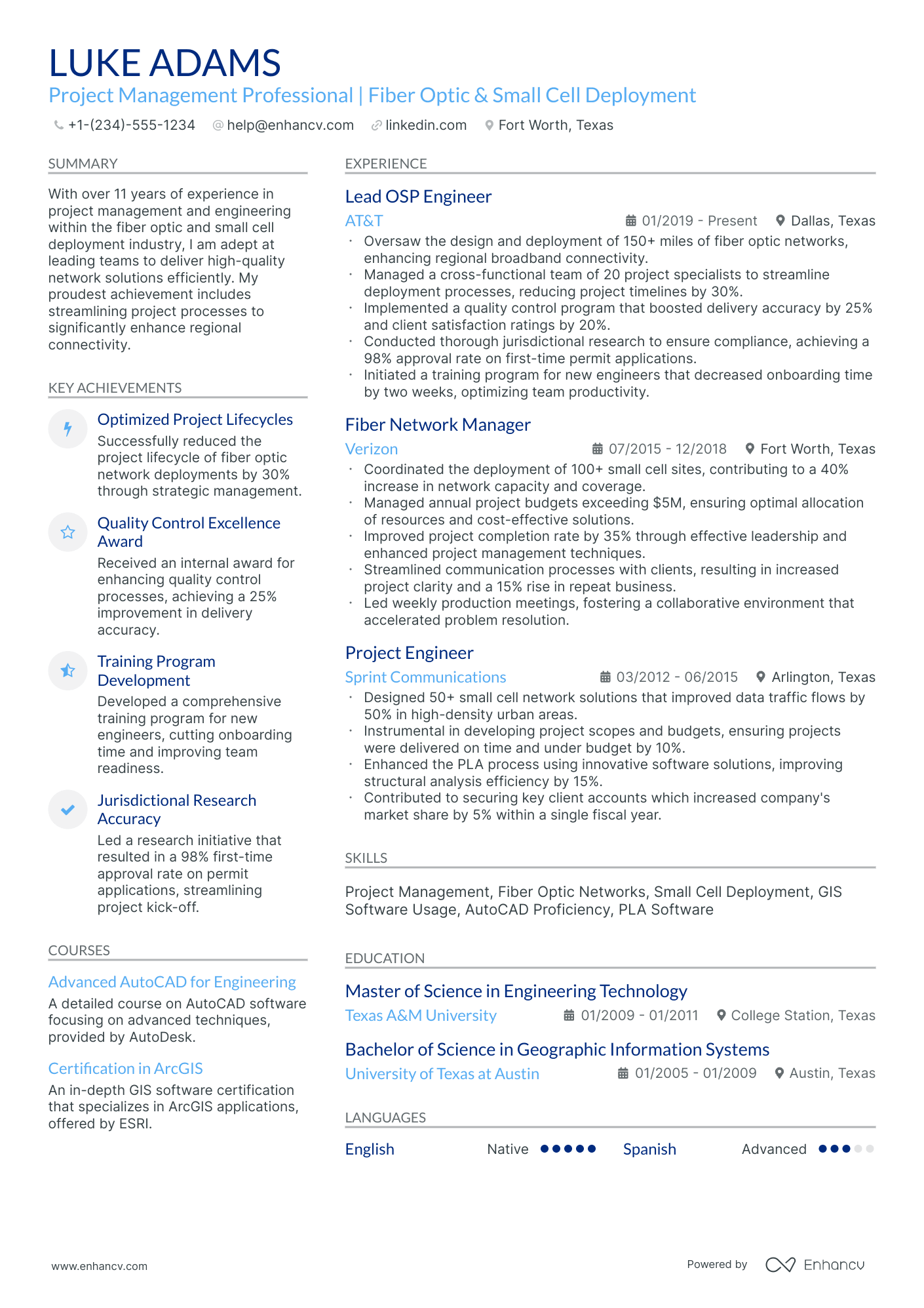As a design manager, one specific resume challenge you may encounter is effectively showcasing your unique balance of creative skills and management experience. Our guide can assist you by providing targeted advice on how to highlight your design projects while simultaneously demonstrating your leadership capabilities.
- Design manager resumes that are tailored to the role are more likely to catch recruiters' attention.
- Most sought-out design manager skills that should make your resume.
- Styling the layout of your professional resume: take a page from design manager resume examples.
How to write about your design manager achievements in various resume sections (e.g. summary, experience, and education).
- Character Designer Resume Example
- Print Designer Resume Example
- Retail Designer Resume Example
- Costume Designer Resume Example
- Mechanical Designer Resume Example
- Magazine Designer Resume Example
- Creative Director Resume Example
- Packaging Designer Resume Example
- Game Designer Resume Example
- Mold Designer Resume Example
How to style your design manager resume: layout and format
When creating your design manager resume, have you ever wondered how long it should be? Experts point out that it should be between one and two pages. Choose the longer format, if you happen to have over a decade of relevant experience. What is more, resume formats play a crucial role in presenting your experience. Use the:- Reverse-chronological resume format to highlight your experience;
- Functional skill-based resume format if you have less experience and want to focus on skills;
- Hybrid resume format to guide recruiters through both your experience and skills.
- Make sure your headline is simple and includes the job you're applying for or your current role, an abbreviation of a certificate you have, or even your professional area of interest;
- Always tailor your design manager resume to the role you're applying for by matching job requirements to your experience via different resume sections;
- Once you've created your resume, download it in PDF (unless otherwise specified). This is to ensure readability and that the layout remains fixed.
Each market has its own resume standards – a Canadian resume layout may differ, for example.
Upload & Check Your Resume
Drop your resume here or choose a file. PDF & DOCX only. Max 2MB file size.
PRO TIP
List your educational qualifications and certifications in reverse chronological order.
The key to your design manager job-winning resume - present your expertise with these sections:
- A header to make your resume more scannable
- Snapshot of who you are as a professional with your resume soft skills, achievements, and summary or objective
- Job advert keywords in the skills section of your resume
- Resume experience quantifying your past job successes with metrics
- A relevant education, certification, and technical sills section to provide background to your technological/software capabilities
What recruiters want to see on your resume:
- Proven experience in leading design teams and successfully delivering design projects
- Strong portfolio showcasing expertise in various design disciplines (UI/UX, graphic, product, etc.)
- Expertise in design thinking and user-centered design methodologies
- Effective communication skills, demonstrating the ability to present design concepts and strategies to stakeholders
- Knowledge of current industry tools and trends, as well as experience with design software (e.g., Adobe Creative Suite, Sketch, Figma)
Quick formula for writing your design manager resume experience section
Have you ever wondered why recruiters care about your design manager expertise?
For starters, your past roles show that you've obtained the relevant on-the job training and expertise that'd be useful for the role.
What is more, the resume work experience section isn't just your work history , but:
- shows what you're capable of achieving based on your past success;
- proves your skills with (oftentimes, tangible) achievements;
- highlights the unique value of what it's like to work with you.
To ensure your resume work experience section is as effective as possible, follow this formula:
- start each bullet with a powerful, action verb , followed up by your responsibilities, and your workplace success.
The more details you can include - that are relevant to the job and linked with your skill set - the more likely you are to catch recruiters' attention.
Additionally, you can also scan the job advert for key requirements or buzzwords , which you can quantify across your experience section.
Not sure what we mean by this? Take inspiration from the design manager resume experience sections below:
- Spearheaded the UX/UI design overhaul for our e-commerce platform, resulting in a 30% increase in customer engagement and a 20% boost in sales.
- Managed a team of 12 designers and collaborated with cross-functional teams to develop and implement design strategies aligning with company objectives.
- Led the rebranding initiative that included a complete redesign of company logo, marketing materials, and product packaging to establish a cohesive brand identity.
- Oversaw the user experience design for a suite of mobile applications, enhancing user satisfaction ratings by 35% within the first year of launch.
- Developed and mentored a diverse design team, fostering continuous professional growth and innovation in design thinking practices.
- Initiated and led a successful cross-platform design system, reducing design inconsistencies by 50% and accelerating development workflows.
- Directed the visual design for a major product line, which achieved a 25% increase in market share due to enhanced aesthetic appeal and usability.
- Implemented data-driven design methodologies that improved user interface effectiveness, as measured by a decrease in user support requests by 40%.
- Championed design thinking workshops company-wide, cultivating a culture of innovation and collaboration that improved project delivery times by 15%.
- Revitalized the corporate website’s user interface, which resulted in an uplift of user time spent on site by an average of 3 minutes per session.
- Efficiently managed design project budgets, saving the company over $200,000 annually by optimizing resource utilization and vendor contracts.
- Orchestrated the integration of virtual reality elements into product demonstrations, increasing customer engagement and retention by 18%.
- Pioneered an innovative AR-based instructional design for field technicians, reducing training time by 40% and error rates by 25%.
- Collaborated with engineering and product development teams to ensure design feasibility, resulting in a streamlined prototype-to-production cycle for new products.
- Established regular user testing sessions, which informed iterative design improvements that increased overall software adoption by 22%.
- Managed the launch of an AI-powered design tool that automatically suggests design improvements, enhancing productivity within the design team by 35%.
- Developed a comprehensive design training program for new hires, which reduced onboarding time from 6 weeks to 4 weeks and improved team cohesion.
- Executed critical user interface updates for legacy products, boosting customer satisfaction scores from 80% to 95% within a six-month period.
- Orchestrated the end-to-end redesign of a flagship software product, which captured a new customer segment and increased user base by 150,000 within two years.
- Leveraged expertise in responsive design to ensure optimal user experiences across all devices, contributing to a 70% increase in mobile user engagement.
- Drove the enhancement of internal collaboration tools using user-centered design principles, which improved inter-departmental communication and project efficiency by 20%.
- Revamped the design department's workflow, incorporating Agile methodologies which reduced time-to-market for new design iterations by 30%.
- Championed the user-centered design approach leading to a product that won the 'Best User Experience' award in a national competition.
- Negotiated with external design agencies and vendors to supplement in-house resources while ensuring cost-effectiveness and high-quality outputs.
- Played a pivotal role in developing the environmental design strategy for the company’s retail stores, enhancing brand presence and customer loyalty.
- Built and led a high-performing team of environmental designers, graphic designers, and architects to deliver projects within tight deadlines.
- Enabled a company-wide transition to sustainable design practices, reducing environmental impact and yielding a 10% cost savings in material expenditures.
- Headed the strategic implementation of inclusive design principles in product development, broadening market appeal and accessibility.
- Fostered partnerships with key industry influencers and design thought leaders to stay at the forefront of design trends and best practices.
- Instituted a comprehensive design quality assurance program that reduced defects by 25% and bolstered the company's reputation for excellence in design.
Quantifying impact on your resume
- Include the number of design projects managed simultaneously to demonstrate project management skills and multitasking ability.
- Highlight the percentage of projects delivered on time to emphasize reliability and time management.
- Specify the budget size of design projects managed to showcase financial responsibility and resource allocation proficiency.
- Mention the percentage increase in user engagement as a result of your design improvements to illustrate impact on user experience.
- Detail the number of team members you have led or coordinated to show leadership and team management capabilities.
- State the quantifiable improvements in operational efficiency through streamlining design processes or tool implementations.
- Present the number of awards or recognitions received for design excellence to underline industry recognition and quality of work.
- Report the cost savings achieved through strategic design decisions, underscoring your ability to contribute to profitability.
Action verbs for your design manager resume
No relevant experience - what to feature instead
Suppose you're new to the job market or considering a switch in industry or niche. In such cases, it's common to have limited standard professional experience. However, this isn't a cause for concern. You can still craft an impressive design manager resume by emphasizing other sections, showing why you're a great fit for the role:
- Emphasize your educational background and extracurricular activities to demonstrate your industry knowledge;
- Replace the typical experience section with internships or temporary jobs where you've gained relevant skills and expertise;
- Highlight your unique skill set, encompassing both technological and personal abilities;
- Showcase transferable skills acquired throughout your life and work experiences so far.
Recommended reads:
PRO TIP
List your educational qualifications and certifications in reverse chronological order.
Design manager resume skills: the essential hard skills and soft skills checklist
Ultimately, your design manager resume should hint to recruiters that you possess an array of talents that are indispensable to the role.
For example, listing the technologies and software you're apt at using (or your hard skills) and how you apply them in your day-to-day responsibilities would ensure you meet the technical requirements of the role.
But is this enough to ensure that you make a good impression on recruiters?
Go a step further by detailing the soft skills or personality traits you've attained thanks to your work and life experience.
The best way to balance hard skills and soft skills on your design manager resume is by:
- Highlighting up to three of your most noteworthy career accomplishments in a separate section.
- Listing at least one hard skill and one soft skill you've used to solve a particular challenge or problem.
- Feature niche skills and technologies that would help you stand out amongst candidates.
- Think back on the social impact your efforts have had towards improving the work environment - were you able to always maintain a professional ethic, while enhancing the team culture? Write about your contribution to the role, department, or organization itself as a metric of success.
The skills section of your resume provides you with plenty of opportunities to detail your technical and personal traits.
All you have to do is select the talents that best fit your application and expertise. Make note of some of the most prominent hard and soft skills across the industry from our list:
Top skills for your design manager resume:
Adobe Creative Suite
Sketch
Figma
InVision
AutoCAD
3D Modeling Software
HTML/CSS
JavaScript
UX Research Tools
Project Management Software
Leadership
Communication
Time Management
Problem Solving
Creativity
Collaboration
Critical Thinking
Adaptability
Mentorship
Conflict Resolution
PRO TIP
If you happen to have plenty of certificates, select the ones that are most applicable and sought-after across the industry. Organize them by relevance to the role you're applying for.
Design manager-specific certifications and education for your resume
Place emphasis on your resume education section . It can suggest a plethora of skills and experiences that are apt for the role.
- Feature only higher-level qualifications, with details about the institution and tenure.
- If your degree is in progress, state your projected graduation date.
- Think about excluding degrees that don't fit the job's context.
- Elaborate on your education if it accentuates your accomplishments in a research-driven setting.
On the other hand, showcasing your unique and applicable industry know-how can be a literal walk in the park, even if you don't have a lot of work experience.
Include your accreditation in the certification and education sections as so:
- Important industry certificates should be listed towards the top of your resume in a separate section
- If your accreditation is really noteworthy, you could include it in the top one-third of your resume following your name or in the header, summary, or objective
- Potentially include details about your certificates or degrees (within the description) to show further alignment to the role with the skills you've attained
- The more recent your professional certificate is, the more prominence it should have within your certification sections. This shows recruiters you have recent knowledge and expertise
At the end of the day, both the education and certification sections hint at the initial and continuous progress you've made in the field.
And, honestly - that's important for any company.
Below, discover some of the most recent and popular design manager certificates to make your resume even more prominent in the applicant pool:
The top 5 certifications for your design manager resume:
- Project Management Professional (PMP) - Project Management Institute (PMI)
- Certified Design Thinking Professional (CDTP) - Design Thinking Association (DTA)
- Adobe Certified Expert (ACE) - Adobe
- Certified ScrumMaster (CSM) - Scrum Alliance
- Lean Six Sigma Green Belt (LSSGB) - International Association for Six Sigma Certification (IASSC)
PRO TIP
List all your relevant higher education degrees within your resume in reverse chronological order (starting with the latest). There are cases when your PhD in a particular field could help you stand apart from other candidates.
Recommended reads:
Practical guide to your design manager resume summary or objective
First off, should you include a summary or objective on your design manager resume?
We definitely recommend you choose the:
- Resume summary to match job requirements with most noteworthy accomplishments.
- Resume objective as a snapshot of career dreams
Both the resume summary and objective should set expectations for recruiters as to what your career highlights are.
These introductory paragraphs (that are no more than five sentences long) should help you answer why you're the best candidate for the job.
Industry-wide best practices pinpoint that the design manager resume summaries and objectives follow the structures of these samples:
Resume summaries for a design manager job
- Dynamic design manager with over a decade of experience, specializing in UX/UI design and team leadership. Proven record of elevating product designs for SaaS companies to front-runner status by integrating user-centric methodologies and driving collaborative projects. Excelled in transforming user insights into successful design features, contributing to a 40% uptick in user engagement for flagship applications.
- With 15 years of experience, this seasoned design manager has steered multiple design teams through high-stakes rebrands and product launches in the competitive consumer electronics sector. Expertise in sketching, prototyping, and 3D modeling software has been instrumental in reducing product development cycles by 25%. Spearheaded the design of an award-winning portable speaker, which captured a 30% market share within the first year.
- Former Marketing Director with 8 years of experience transitioning into a Design Management role, bringing a unique perspective on branding and consumer psychology. Demonstrated mastery in campaign design and cross-functional collaboration, driving a 45% increase in online engagement for a national retail chain through targeted rebranding efforts.
- Accomplished Project Manager seeking to leverage 12 years of experience in overseeing construction projects by transitioning to Design Management. Passionate about sustainable design principles and adept in harnessing Autodesk suite to optimize project outcomes. Led the completion of the first LEED-certified commercial building in the region, significantly elevating the firm’s profile in sustainable design.
- Eager to embark on a career in Design Management, I am committed to making a meaningful impact by utilizing my in-depth knowledge of current design trends and strong aesthetic sensibility acquired through a recent Master’s in Design Innovation. As a fresh talent, I am dedicated to learning rapidly and contributing to the creation of intuitive and delightful user experiences.
- New to the field of Design Management and equipped with a Bachelor’s degree in Industrial Design, my goal is to apply my strong grounding in design thinking and collaborative skills to foster an environment of innovation. With strong problem-solving abilities and a passion for user-centered design, I am poised to support and contribute to the success of creative design projects.
Optimize your resume summary and objective for ATS
Drop your resume here or choose a file.
PDF & DOCX only. Max 2MB file size.
Miscellaneous design manager resume sections for a more personalized approach
Your design manager resume can reflect even more upon your personality and best qualities - that is if you decide on including a couple of additional resume sections to support your application.
Some of the best-accepted industry-wide choices include the:
- Resume projects - getting into the outcomes of your most important work, so far;
- Languages on your resume - detailing your proficiency level;
- Special recognitions - dedicated to your most prominent industry awards;
- Hobbies and interests - defining how you spend your free time.
Key takeaways
- Your resume layout plays an important role in presenting your key information in a systematic, strategic manner;
- Use all key resume sections (summary or objective; experience; skills; education and certification) to ensure you’ve shown to recruiters just how your expertise aligns with the role and why you're the best candidate;
- Be specific about listing a particular skill or responsibility you've had by detailing how this has helped the role or organization grow;
- Your personality should shine through your resume via the interests or hobbies, and strengths or accomplishments skills sections;
- Certifications go to provide further accreditation to your technical capabilities, so make sure you've included them within your resume.
